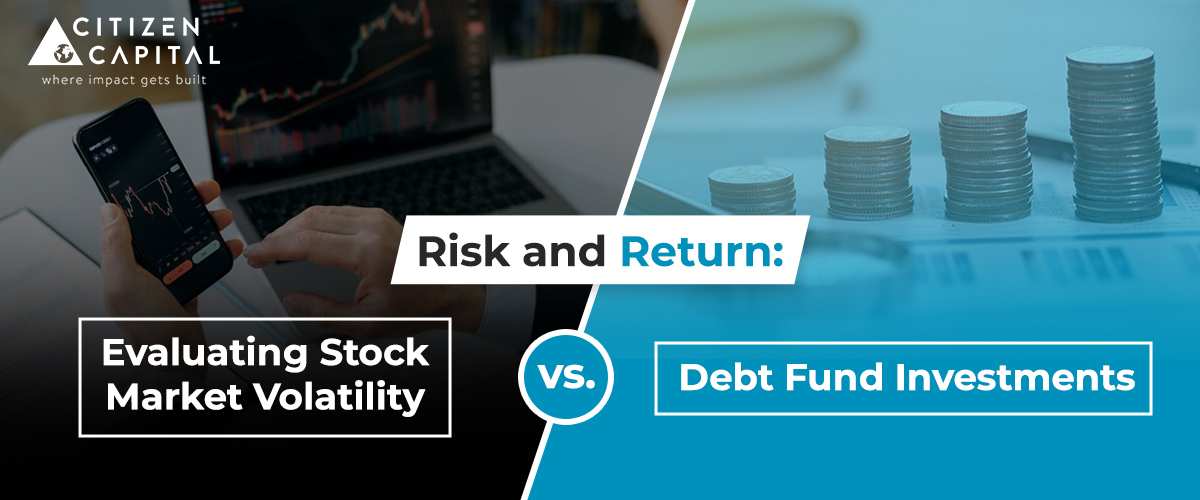Investing in financial markets can be both exciting and nerve-wracking. One of the fundamental principles of investing is the trade-off between risk and return. This concept is particularly relevant when comparing two popular investment options: the stock market and debt funds. This blog will explore the key differences between these asset classes, their associated risks and returns, and how you can make informed decisions to meet your financial goals.
Stock Market: The Volatile Giant
Investing in the stock market offers the potential for high returns but also comes with a significant degree of volatility. Stock prices fluctuate wildly due to various factors, including economic conditions, company performance, and global events.
Here are some key aspects to consider when evaluating the risk and return of stock market investments:
- High Potential for Returns: The stock market has historically delivered some of the highest long-term returns among all investment options. This means that, over time, your investments can grow substantially.
- Market Volatility: The stock market is prone to short-term fluctuations and can experience sharp declines during economic downturns or market crises. Investors need a strong stomach to weather these ups and downs.
- Diversification: Reducing risk in the stock market can be achieved through diversification. Diversifying your stock portfolio across different industries and asset classes can mitigate some volatility.
- Long-Term Horizon: Investing in stocks often requires a longer time horizon to ride out market volatility and capture potential gains. Patience is key.
Debt Funds: Stability with Moderate Returns
Debt funds, on the other hand, are known for their stability and lower risk profile. These funds primarily invest in fixed-income securities like bonds, government securities, and money market instruments.
Here’s what you need to know about debt fund investments:
- Steady Income: Debt funds provide a predictable income stream through interest payments from their underlying securities. This makes them an attractive option for conservative investors seeking regular income.
- Lower Volatility: Compared to stocks, debt funds are less volatile. They are less affected by market swings and are considered a safer option during economic uncertainties.
- Lower Returns: Debt funds offer stability but typically generate lower returns than stocks. The trade-off for reduced risk is a modest growth in your investment.
- Shorter Investment Horizon: Debt funds can be suitable for investors with a shorter investment horizon or those who want to preserve capital.
Balancing Act: Choosing the Right Mix
The decision between investing in the stock market or debt funds should align with your financial goals, risk tolerance, and investment horizon. Here are some factors to consider when striking the right balance:
- Risk Tolerance: Assess your risk tolerance honestly. Are you comfortable with the ups and downs of the stock market, or do you prefer a more stable investment?
- Financial Goals: Your investment goals play a crucial role. If you’re saving for retirement and have several years ahead, you may lean towards stocks for growth. If you’re saving for a short-term goal or need regular income, debt funds might be a better fit.
- Diversification: Combining stocks and debt funds in your portfolio can help you balance growth and stability. This approach can spread risk and create a more resilient investment strategy.
- Professional Advice: Consult with a financial advisor who can help you create a customized investment plan based on your unique circumstances.
Conclusion
The choice between stock market investments and debt funds is not an either-or decision. It’s about finding the blend that aligns with your financial objectives and risk tolerance. The stock market offers the potential for higher returns but comes with higher volatility, while debt funds provide stability and steady income at the cost of lower returns. Ultimately, a diversified portfolio that combines both asset classes can help you navigate the complex terrain of risk and return, providing a balanced approach to wealth accumulation and preservation. Remember, informed decision-making and a long-term perspective are essential to successful investing.
About Citizencap
Explore CitizenCap: Your Gateway to Non-Traditional Investments! Unlock High Returns with Our Phoenix-Based Real Estate Lending Expertise. Partner with us for Tailored Investment Success.
